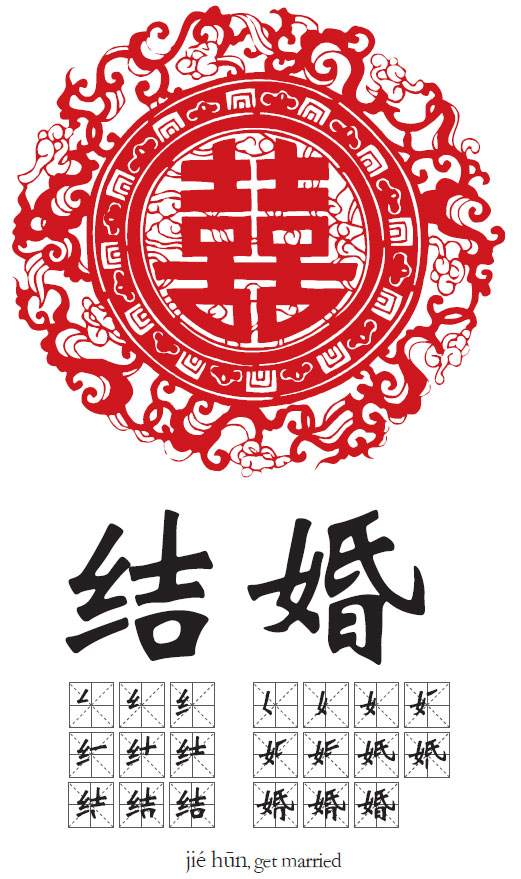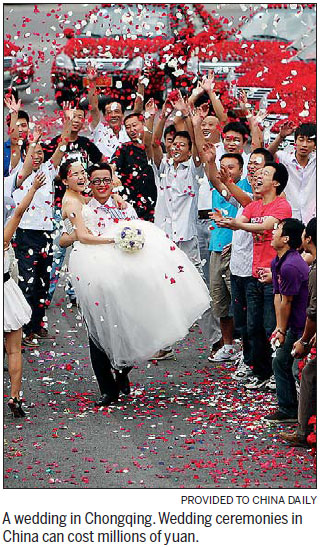Breaking the bank to tie the knot
Updated: 2015-05-29 08:24
(China Daily Europe)
|
|||||||||||
Wedding costs soar in China as display of love becomes a show of wealth
In China, as in other countries, the act of marriage is supposed to be a cause for celebration, a wonderful expression of eternal love that is cemented in traditions and customs. So how has it turned into such a money pit?
Today, wedding ceremonies can cost millions of yuan, and expectations for that glamorous day are ever-rising - much to the dismay of the lucky couple and their guests.

According to Time-Weekly, Shanghai is home to the biggest spenders, with the average wedding there costing 230,000 yuan ($37,500; 34,000 euros). Other major cities such as Beijing and Shenzhen are not far behind.
The national average is a more moderate $12,000, according to the China Wedding Industry Development Report; yet that is no paltry sum for a young couple.
"We never expected an expensive wedding, but everywhere wanted money," says Wang Ying, who got married in October. "We were over budget on everything. Even the bridal bouquet cost hundreds."
Cheap, traditional weddings can still be found throughout China, but the booming economy in recent decades has turned the wedding business into a lucrative industry, fueled largely by tuhao, the name given to China's tacky nouveau riche.
In Fujian province, the marriage of a ceramic magnate became an eight-day extravaganza, with a dowry of more than 100 million yuan for the bride, while a wedding procession in Wuhan featured a Maserati, an Audi, and a bright-pink Ferrari, all accompanied by models and choreographed dancers.
Things were not always like this. In the 1960s, all that was needed for a wedding were the "36 legs" (some say 72 legs), referring to the custom of newlyweds preparing wood furniture beforehand - beds, tables, chairs, wardrobes - so that the legs added up to a lucky number. Even dinner with close friends and family was optional.
As with everything in China, things changed after the reform and opening-up that began in the late 1970s. It started with the "three big items" for any wedding - a watch, a sewing machine and a bicycle. Later, a radio was added to the list. The estimated cost for this, together with the "36 legs", would be about 420 yuan.
By the 1980s, a refrigerator, a color television and a washing machine were added, and wedding dinners became the norm. Ten or 20 yuan in a red envelope called hongbao was seen as a generous gift from a guest.
However, as the economy developed, expectations soared. Those "big items" have been relegated to history, giving rise to the weddings we see today - Western-style gowns, luxury cars, exquisite bridal makeup and wedding photos.
According to wedding planners, ceremonies today can be divided mainly into three categories: Chinese, Western, or a mix. A Chinese-style wedding with a red bridal dress and traditional rituals can cost 20,000 yuan, covering the master of ceremonies, makeup, video recording, photography and the venue.
There is an upside to all this pageantry: the economy. According to IBIS World's Wedding Services Market Research Report in January, the wedding services industry in China generated total revenues of $22 billion last year. For the past five years, annual growth has been about 5.1 percent.
With China's large population and high marriage rate, the market potential for this revenue stream is limitless.
There is, perhaps, no better place to witness China's wedding extravagance than at a wedding expo, a tradition that began in 2005. Held every year in various places around the country, the event features a full range of wedding products and services, and attracts hundreds of thousands of visitors.

The question remains as to why China was so quick, after all the austerity of the recent past, to build an industry out of weddings. Well, the traditional belief in China is that marriage is one of life's most important events. Throughout history, a grand wedding was essential for justifying a marriage, and if the wedding was too simple or crude, the two families risked breaking the rules of etiquette and decency.
"You are taking a wife who will accompany you for the rest of your life. The money spent on a wedding is just a trifle compared with that," says Li Liang, who will marry his fiancee this year. "The event is evidence of my love."
In many ways, though, a wedding is not the most important event in life for the couple, but for their parents. It is often said parents spend half of the money, invite more than half the guests, and do more than half of the preparation work. Sometimes the newlyweds don't even know the people at their wedding.
"We didn't want a luxurious wedding, but our parents insisted," newlywed Wang says. "They would have felt humiliated if our wedding wasn't good enough."
And it is not just the happy couple or parents who may break the bank for a wedding. A great deal of pressure is also put on guests to cough up cash.
In China, the conventional gift for a wedding is unimaginative - hongbao. The general rule is, the closer you are to the couple, the more money you are expected to put in the envelope. Hence, lovingly crafted wedding invitations are often called "red bombs".
A large wedding means more hongbao. It's important to remember that the happy couple spending money on the wedding day has been through the hongbao gauntlet many times.
"It's just like a kind of unscheduled deposit. You give money many times, and when you get married you get to withdraw it just once," says Hu Qipeng, who has recently been invited to four weddings. "If three friends get married in the same month, my salary runs dry."
However, even red envelopes cannot cover the cost of weddings. In many cases, weddings are tools to flaunt wealth, bringing us back to tuhao. You don't have to look far for weddings that are simply beyond the pale.
Stories of extravagance abound. But not everyone is following the trend. Many people born in the 1980s and 1990s are trying to pull marriage back to an acceptable level.
The term "naked marriage" emerged in 2008 and refers to when the couple does not have a house, car, or a grand wedding ceremony. Some said the situation was made inevitable by the increase in house prices. Yet for some, the less-is-more concept is a deeply held conviction.
In 2012, Liu Bing, a student at Nanjing University, married his classmate Yan Jizhang. The bride was picked up from her dorm, the banquet was held at a campus park, and the bridesmaid and the best man were the couple's roommates. Everything was simple, and even the wine was poured into disposable paper cups. A similar wedding at Southwest University in 2013 cost a total of 400 yuan.
Although statistics point to a snowballing wedding industry, the new generation seems keen to throw off both the cost of lavishness and the burden of tradition. For now, the wedding industry stands strong and is ready to continue raking in profits.
So, how much does it cost to get married in China? The simplistic answer is 9 yuan, to pay for the certificate from the local bureau of civil affairs. The rest is up to you.
Courtesy of The World of Chinese, www.theworldofchinese.com
(China Daily European Weekly 05/29/2015 page27)
Today's Top News
British Queen makes references to China in keynote speech
Bayern cashes in on Chinese fans' frenzy for European soccer
German rail giant mulls buying trains from China
Blair to resign as Middle East Quartet envoy
London stock exchange takes steps to include China A shares
China calls for durable settlement of Kosovo issue
China urges BRICS to unite for promoting multi-lateralism
New way to enjoy movie in Berlin
Hot Topics
Lunar probe , China growth forecasts, Emission rules get tougher, China seen through 'colored lens', International board,
Editor's Picks

|

|

|

|

|

|






